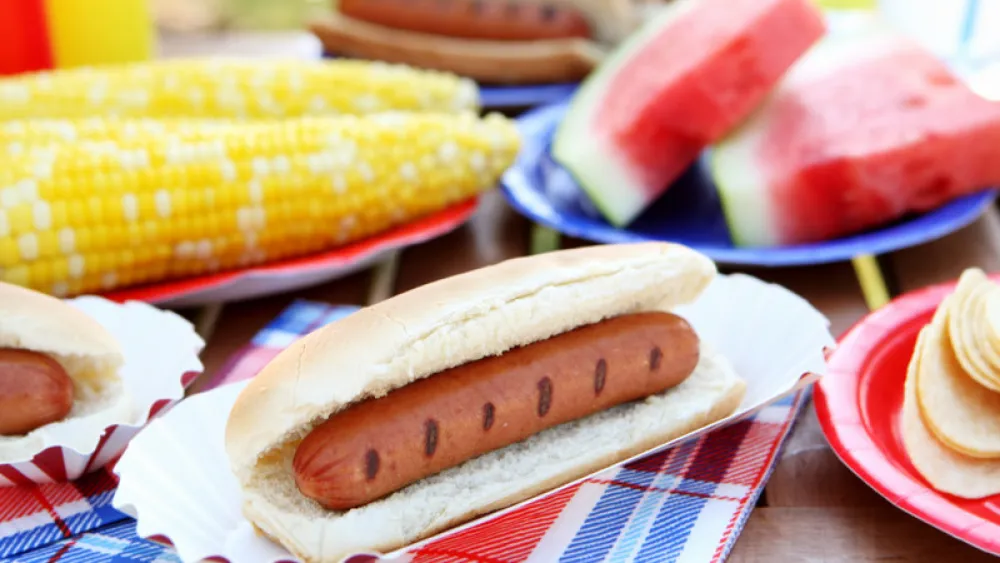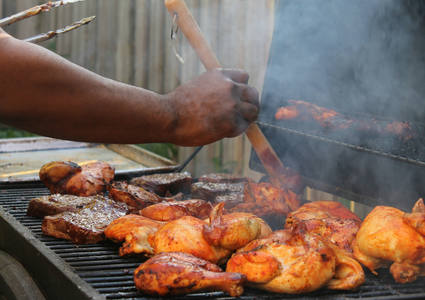Healthy Lifestyle
Top 7 Tips for Summer Picnic Food Safety
Published: July 1, 2020

Summertime and outdoor picnics seem to go hand-in-hand. Sunny days and beautiful weather are simply built for summer fun. But with the warm temperatures comes an extra ounce of precaution when it comes to keeping your food safe.
Along with making healthy food choices for your outdoor barbeque, it’s important to know the steps to make sure your tasty dish doesn’t spoil. Anyone, especially infants, young children, seniors and pregnant women, or someone with an immune compromised state, needs to be careful with food safety.
The most common dangerous food-borne bacteria include salmonella, norovirus, E. coli, listeria, campylobacter and clostridium perfingens. They may cause food poisoning and result in illness, hospitalization and even death.
So how can you make sure the food you serve is safe?
Top 7 Summer Food Safety Tips
1. Start at the store. Yes, even as you peruse the grocery aisles for your food needs, you need to keep food safety in mind. Stop in the refrigerated section LAST, so the food is still cold upon checkout. Head straight home and put your food purchase in the refrigerator within two hours. Immediately freeze any ground meats or poultry that won’t be used in a day or two.
2. Keep raw meats separate. Meat juices are a breeding ground for harmful bacteria which may contaminate other safely prepared foods.
Use a little disinfectant and water to remove bacteria from sinks, countertops and serving dishes. Cutting boards should be cleaned well by either putting them in the dishwasher or clean with soap and hot water.
Store raw meats on the lowest shelf in your refrigerator, so any juices won’t drip onto and ruin other foods.
3. Thaw meats properly. The best, safest way to thaw frozen meats is by putting them in the refrigerator, which allows the meat to thaw slowly and keep it at a safe temperature. If you need to thaw foods more quickly, use the “defrost” function on your microwave.
4. Wash fruits and veggies. Before you serve, make sure all those delicious fruits and veggies are clean. Even if they are prepackaged, it’s better to be safe than sorry.
There’s no need to invest in those special sprays. With melons or fruits that have an outer shell, use a vegetable brush and water to clean. Rinse other fruits and veggies in cool water to clean. Salad spinners are a great investment for after rinsing lettuce.
 5. Mind the grill. Proper grilling starts with a clean surface. Preheat your grill on high for 15-20 minutes before adding food to kill bacteria that may be lingering on the grates. After preheating, clean the grill rack using aluminum foil or nylon brushes and carefully inspect the surface for cleanliness before adding food.
5. Mind the grill. Proper grilling starts with a clean surface. Preheat your grill on high for 15-20 minutes before adding food to kill bacteria that may be lingering on the grates. After preheating, clean the grill rack using aluminum foil or nylon brushes and carefully inspect the surface for cleanliness before adding food.
Once you add the foods, cook them to the proper temperature. (Undercooked foods is one of the biggest offenders of food poisoning!) Because meats tend to brown quickly on the outside, It is best to test the internal temperature with a food thermometer to make sure it is thoroughly cooked.
6. Keep the hot foods hot and the cold foods cold. Temperature really is everything.
Hot food should be kept over 140 degrees and cold foods at less than 45 degrees. After two hours, place food back into the refrigerator.
This rule applies to most soft foods. It is safe to have veggie trays, cracker and chips out for longer than two hours, but dips, soft cheeses, salads and meats need to be placed back in the refrigerator after two hours. Use pans of ice under chilled foods such as shrimp or mayo-based salads.
7. Wash your hands! Of course we can’t forget that handwashing is one of the most important tips when it comes to food prep and handling. Wash your hands often when handling foods, especially when handling raw meats. You might be surprised how quickly germs and bacteria can spread!
When the Party Is Over
After the clean-up, you might be tempted to pack up leftovers and send them home with your guests. If you do, remind your guests that the food should be eaten within three or four days. Throw out anything that may be questionable or left sitting out too long.
Just remember: When in doubt, throw it out!
If you have any questions about food safety, talk with your Methodist Physicians Clinic primary care provider or a Methodist Registered Dietitian.


